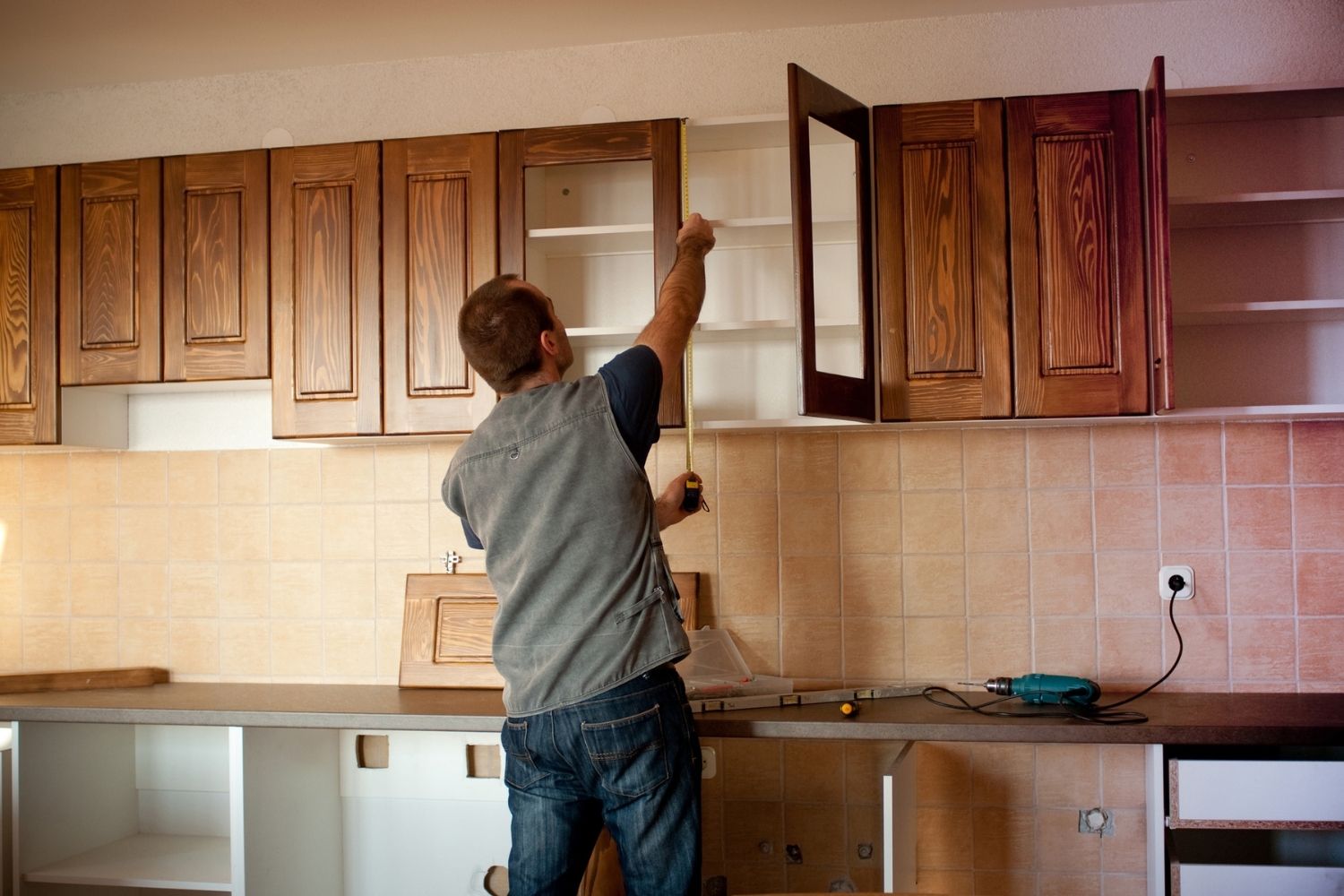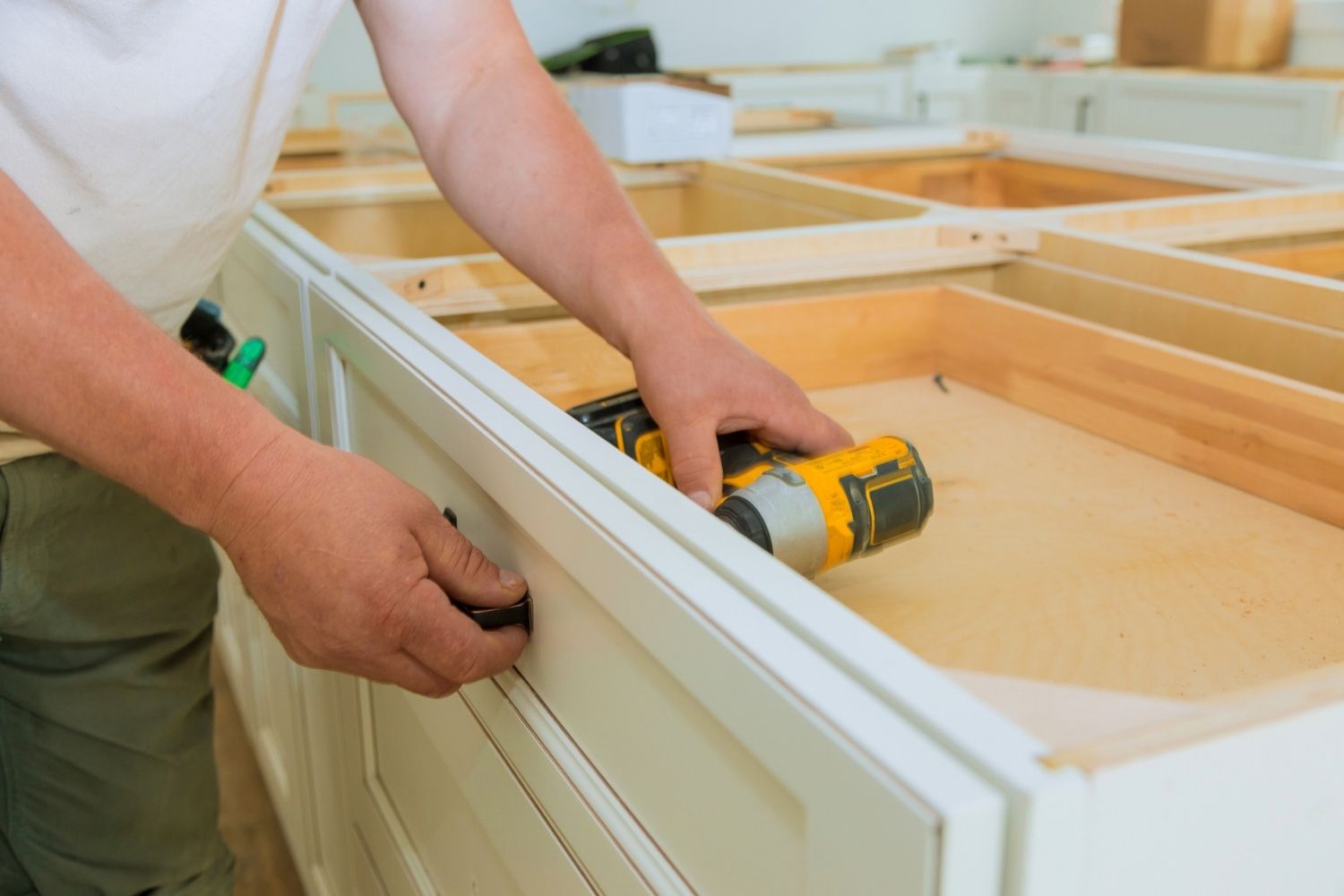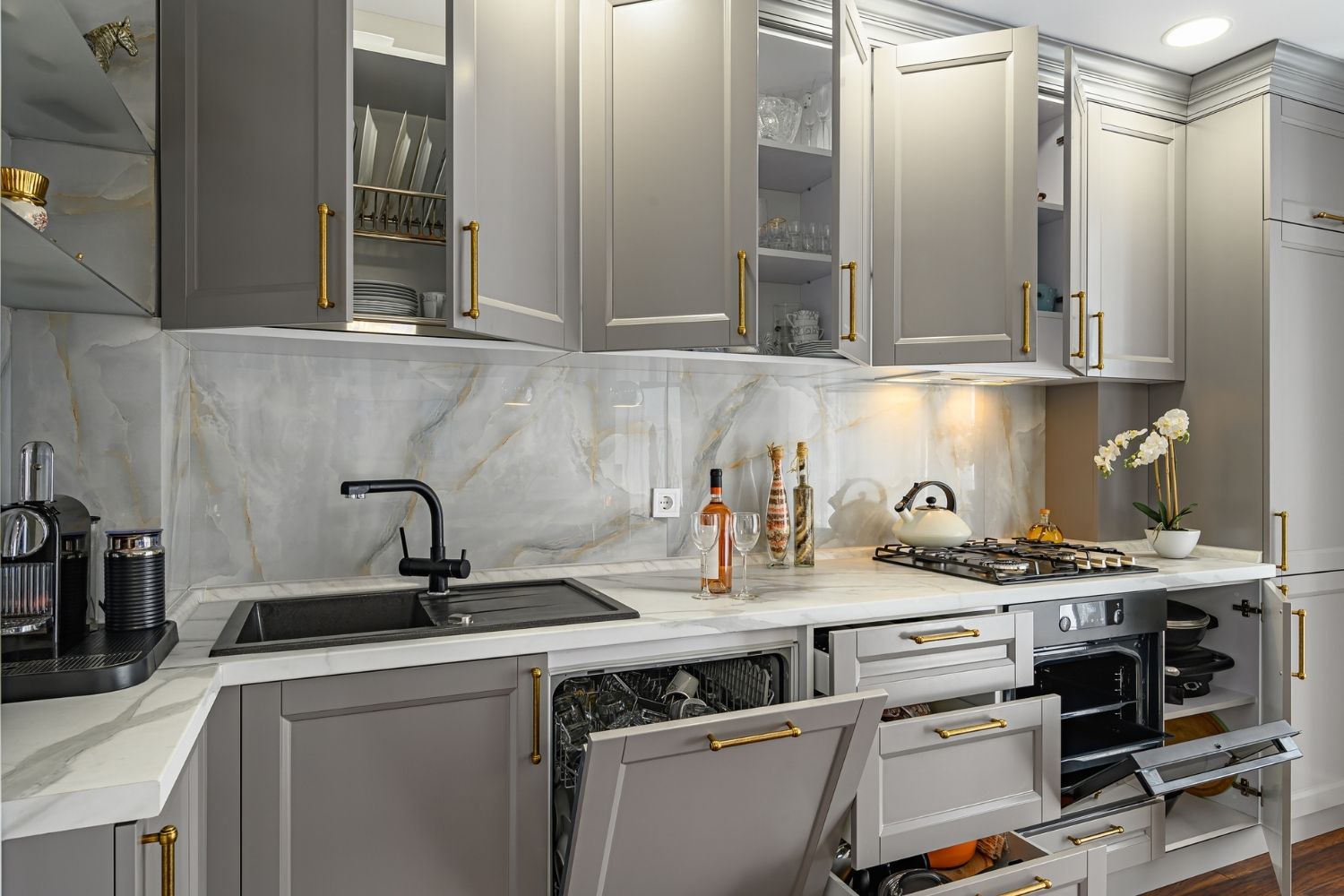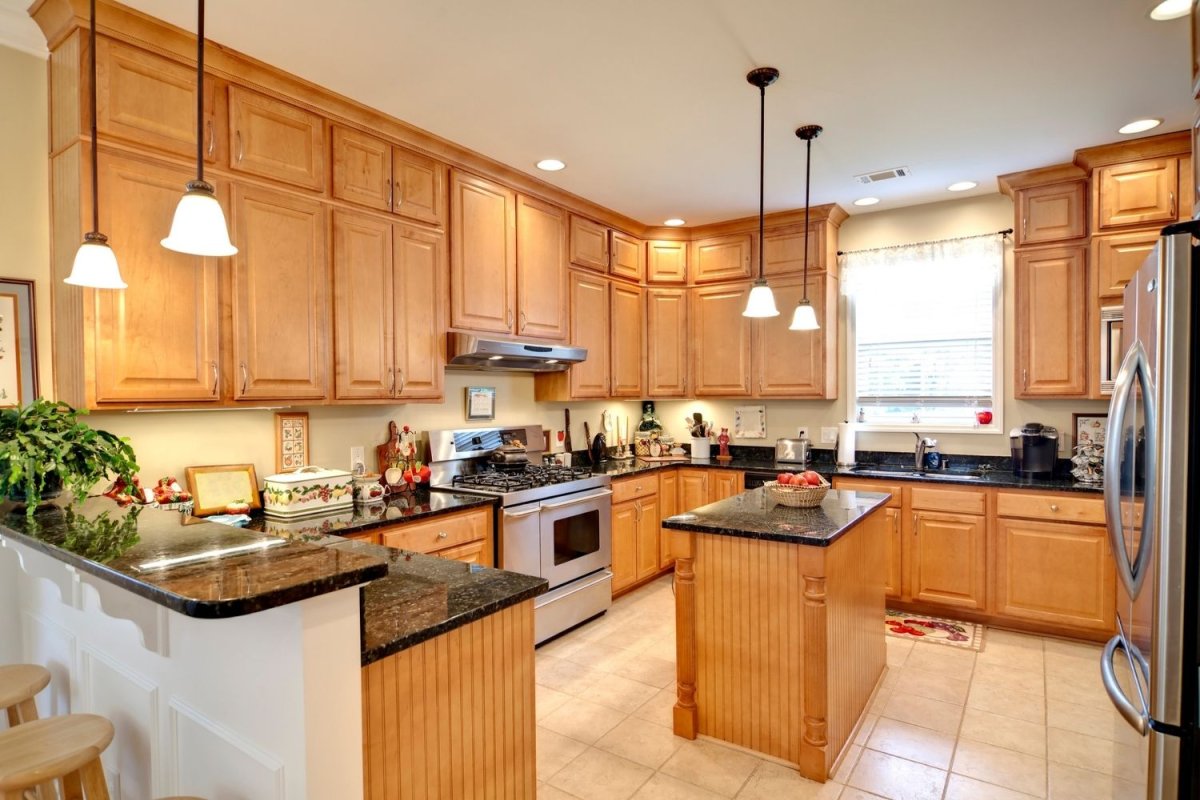We may earn revenue from the products available on this page and participate in affiliate programs. Learn More ›
Highlights
- The typical cost range for refacing kitchen or bathroom cabinets is $4,501 to $10,546, with a national average cost of $7,220.
- The exact cost of cabinet refacing will depend on factors like the material quality, the room location and size, the cost of labor, and the geographic location of the home.
- There are many benefits of refacing cabinets, including affordability, sustainability, numerous style options, fast installation, and increased kitchen or bathroom accessibility.
- Cabinet refacing could be a DIY project for some homeowners, but many choose to trust a pro for this task. A professional can avoid costly mistakes and complete the project much faster than the average handy homeowner.
Tired of the old, outdated cabinets in your house? A full kitchen or bathroom remodel to replace old cabinets and update the footprint is no small task—and it’s pricey. That’s why more homeowners are opting for an alternative: cabinet refacing. You get all the benefits of the fresh look of new cabinets but with less work and cost. According to Angi and HomeAdvisor, homeowners pay between $4,501 and $10,546, with an average of $7,220 for cabinet refacing costs. The number of cabinets being refaced, materials, and labor rates will determine the price. Completing a full kitchen cabinet refacing will cost more than just a bathroom cabinet refacing since it’s a larger space.
What Is Cabinet Refacing? How Does Cabinet Refacing Work?
Cabinet refacing is the happy medium between tearing out and replacing cabinets and simply updating the exterior. When homeowners choose to reface their cabinets, the contractor removes the cabinet doors and hardware, then works to reapply new laminate or veneer finish, doors and drawers, and hardware. They will also make any minor repairs. A homeowner can get totally updated cabinets for nearly half the cost of a complete cabinet replacement project, which is why it’s an appealing option for cost-conscious homeowners. It may not be the best option, however, if the existing cabinets are damaged, don’t operate well, or if a homeowner just needs a better layout. A refacing project works more to update the look rather than the functionality or overall design of the kitchen cabinets. When a cabinet refacing project is complete, the kitchen will feel brand new within the original footprint.
Refacing vs. Replacing vs. Refinishing
When it comes to updating cabinets, there are three options: refacing, replacing, and refinishing. Here’s the breakdown of how each option works, plus their average costs.
Refacing cabinets typically costs between $4,501 to $10,546, which averages at least 30 to 50 percent less than replacing. The installer can update the entire finish to a new color or texture; add new doors, drawers, and hardware; and correct minor problems. During the update, the cabinet boxes remain in place, but they’ll be treated and refreshed with a new veneer surface.
Replacing cabinets offers the chance to completely redesign the layout and number of cabinets in the kitchen. It’s a more complex process that will include other considerations like new flooring to cover where old cabinets were, adjusting light fixture positions, and installing new countertops. When a cabinet is replaced, the entire cabinet box will be removed to make room for new cabinets. The cost to replace cabinets (not including other remodeling costs) averages $400 to $3,500 linear foot, compared to $210 to $750 per linear foot to reface them.
Refinishing cabinets is an even more cost-conscious option, but it comes with limitations. Refinishing a cabinet means the cabinet is simply resurfaced with new paint or stain. Some cabinets cannot be refinished, so it’s not always an option. Additionally, refinishing a cabinet doesn’t include changing the doors and drawers for a new design. However, this may be all a homeowner needs if their cabinets are a classic style and just a little worn down. The cost to refinish cabinets typically falls between $3,000 and $5,000.

Key Cost Factors
When planning a budget for cabinet refacing costs, homeowners will need to factor in the quality of materials, the size of the kitchen or room being updated, and labor rates by location.
Quality of Materials
There are a few options for refacing existing cabinets: laminate, high-quality veneer, and real wood veneer. Laminate is the cheapest and may crack or chip over time, while real wood is the most durable option since it’s an extremely thin piece of actual wood placed over the cabinet pieces. The price will entirely depend on how many cabinets will need to be refaced and current local rates, but some general averages are as follows.
- Plastic laminate costs $1,000 to $3,000 total.
- Rigid thermofoil laminate costs $1,000 to $3,000 total.
- High-quality veneer costs $2,500 to $6,500 total.
- Real wood veneer costs $6,000 to $14,000 total.
- Solid wood or plywood costs $5,000 to $10,000 total.
Kitchen Size
Every cabinet that needs to be refaced adds cost to the total price. For any remodeling project, large kitchens naturally cost more than smaller kitchens, and refacing cabinets is no different. For an average full-size kitchen, homeowners will likely pay between $7,000 and $12,000 to reface 30 linear feet of kitchen cabinets. The cost per linear foot for various cabinet materials is as follows.
- Laminate cabinets cost an average of $100 per linear foot to reface.
- High-quality veneer cabinets cost an average of $200 per linear foot to reface.
- Real-wood veneer cabinets cost an average of $455 per linear foot to reface.
Labor and Time
It’s a time-intensive, challenging process to prep and reface cabinets. A contractor will have to carefully measure inside and out before removing the doors and drawers and sanding down every exposed surface. Only then can the new finish be applied and the new doors, hardware, and drawers replaced. In general, more than half of the total project cost will go toward labor, and the labor costs will be higher for a more complicated project that takes longer to complete.
Geographic Location
Labor and material costs vary significantly based on your location. Urban areas tend to have higher costs than more rural or suburban areas, and prices differ even from one metropolitan area to the next. Here are some average cabinet refacing costs by city:
- Boise, Idaho: $2,640
- Boston, Massachusetts: $6,740
- Chicago, Illinois: $7,020
- Denver, Colorado: $5,380
- Houston, Texas: $5,890
- Los Angeles, California: $8,600
- Nashville, Tennessee: $6,420
- New York City: $7,630
- Tampa, Florida: $5,240
Additional Costs and Considerations
When venturing into a cabinet refacing project, there are additional options to improve the appearance of a kitchen or bathroom. Refinishing a countertop is a popular option, but homeowners may also want to update some cabinet accessories, hardware, or mirrors.
Countertop Refinishing
If a homeowner is updating very old cabinets, it’s worth considering updating laminate countertops simultaneously. Once the cabinets pop with a fresh finish, the countertops may stick out like a sore thumb. Depending on the size and kind of counters, refinishing costs between $300 and $500, while replacing them will cost closer to $1,875 to $4,350. Homeowners will want to make sure they match the colors so everything in the kitchen blends well.
Cabinet Accessories
Refacing cabinets is only one way to bring up the kitchen’s appeal. Many homeowners also opt to add under-the-cabinet lighting (around $200 to $300 per light), crown molding (around $7 to $16 per linear foot), or glass inserts (around $100 and $300 per linear foot). Additional upgrades could include hideaway trash cans, built-in wine racks, or new lazy Susans. Homeowners can ask their local contractors which other services they offer and at what price.
Hardware Replacements
The cost to replace hardware on a kitchen cabinet typically falls between $100 and $1,000, depending on the style chosen. hat cost can increase to as high as $10,000 for custom or antique hardware. Replacing the cabinets’ knobs or handles could be essential to the overall upgrade since some hardware clearly dates itself. Prices range widely for new handles, so a homeowner could pay from $1 up to $100 per piece. Hinges are a much cheaper piece of hardware that usually cost between $1 and $25 each.
Cabinet Mirror Replacement
Some bathrooms have a built-in cabinet mirror. These are a little more challenging to replace since they’re a somewhat custom piece, but homeowners can expect to pay $250 to $900, including installation. As always, this is dependent on the size and quality of materials.

Cost by Type of Material
There are four common types of finishes to choose from to reface cabinets. But within those options, there are several colors and textures available. Some are a more durable choice than others, but even budget-friendly options will work well to update the cabinets’ appearance.
Wood Veneers
Wood veneers are a high-quality option that gives the best faux wood look without the higher cost of natural wood. They come as thin strips or sheets of material made to look like oak, birch, walnut, maple, ash, hickory, and more. They will need to be sealed to help protect against wearing out in a moist kitchen or bathroom environment. Wood veneer is stronger than laminate but not as robust as real wood. The average cost ranges from $2,500 to $6,000.
Plastic Laminate
Laminate refacing costs between $1,000 and $3,000. It’s one of the cheaper options that offers many color choices. It doesn’t have the long-lasting resistance to chipping or cracking that other refacing materials provide. Laminate can easily wrap corners as compared to veneer or wood, making refacing with laminate easier.
Rigid Thermofoil
In certain areas, the most budget-friendly option could be rigid thermofoil laminate. It’s a plastic laminate that also looks like wood and requires little care. This type can be made with Formica or melamine, but the melamine version will not work well in humid or hot environments. Homeowners will pay an average of $1,000 to $3,000 for this type of cabinet refacing.
Solid Wood
Solid wood refacing material is the best long-term investment for refacing cabinets, but it’s also the most costly. However, solid wood is the easiest to repair or replace, and it lasts the longest. The doors and drawers are extremely durable after being refaced. For $5,000 to $10,000, a homeowner can have solid wood refacing done to make their cabinets look brand new.

Benefits of Cabinet Refacing
Most Americans spend a lot of time in the kitchen, especially when it’s designed with an open floor plan that extends right into a roomy sitting area. When there are old cabinets in the kitchen, it can feel dreary and dull walking into the space since they take up most of the kitchen’s visual space. If a full kitchen remodel isn’t an option, refacing the cabinets might just give the refreshing feeling you’re searching for. There are several styles and options, and the process is faster than a remodel, more cost-effective, and more environmentally friendly.
Return on Investment
A homeowner might be wondering whether refacing cabinets is a good investment: It definitely is. Cabinet refacing costs have a 65 to 75 percent return on investment (ROI). Not only that, but fresh cabinets are a huge selling point for those looking to sell their home. Additionally, refacing the cabinets helps extend their lives by another 20 to 30 years.
Style Options
There are almost as many refacing options as there are cabinet options. A homeowner can update the cabinets with gray driftwood, bright white, or a dramatic black contemporary look. The color, style, or texture of the cabinets can completely transform the room. A home refresh doesn’t have to include blowing out walls, redesigning the footprint, or other expensive options when so many styles for refacing are available at a lower cost. Homeowners may want to take a walk through The Home Depot or a local cabinet company to see what options are available for cabinet refacing.
Fast Installation
A kitchen remodel can take weeks, depending on how big the project is, but a cabinet refacing project takes less than a week. It’s the simplest and fastest way to improve any room that needs a cabinet update. The cabinet boxes remain in place, so the installer only has to reface each surface, update the hardware, and install the new or updated doors and drawers.
Kitchen Accessibility
Most cabinet refacing projects happen in the kitchen, where the majority of the cabinets are located. In most cases, kitchens have more space for the installers to work, so it’s easier to get the job done, which means the homeowner will pay less for labor.
Environmentally Friendly Choice
If a homeowner is conscious about their carbon footprint or the amount of waste they produce, cabinet refacing is the most sensible choice compared with an entire remodel. Installers don’t need to rip out and dispose of all the old cabinets, walls, flooring, or any other material that gets removed during a remodel.
Cost-Effective Choice
Cabinet refacing is a much smaller job that gives homeowners all the benefits of a total cabinet makeover. Homeowners will get fresh, clean, stylish cabinets at less than the cost of installing new ones since they’ll save money on materials and labor.

DIY vs. Hiring a Professional
Most homeowners are aware that installing cabinets can be challenging to make sure they’re level and even. But what about refacing cabinets? Surprisingly enough, refacing a cabinet is considered more challenging than installing cabinets since the materials take some time to get familiar with. Refacing cabinets is not to be confused with refinishing cabinets, which is a typical and more straightforward DIY improvement project that many homeowners take on. But refacing projects are best left to a pro. Making mistakes can quickly eat away at any savings a homeowner may have realized by attempting a DIY cabinet refacing project, not to mention it will likely take them much longer to complete.
Veneer, laminate, and solid wood refacing materials are challenging to measure and apply to the cabinets to ensure they resist falling apart or allowing moisture in over time. Installers use a variety of uncommon tools to get the job done, too. This experience is what allows you to have freshly updated cabinets in a mere 3 to 5 days that will last for years to come. For added peace of mind, the installation company should offer a warranty or guarantee to help protect the homeowner’s investment.
How to Save Money
We all prefer to save money on big home improvement projects since they can quickly eat up a budget. Fortunately, refacing your cabinets is already cheaper than replacing them, so you’re well on your way to saving money. Check out these tips for saving even more money on cabinet refacing costs.
- Shop around: Ask for quotes from at least three reputable companies.
- Choose your hardware carefully. New handles, knobs, and hinges can quickly increase costs.
- Look for deals. See if you can get the hardware you like at a lower cost from a local hardware store rather than through the installer.
- Choose lower-cost materials. Opt for a cheaper material than solid wood.
- Consider different styles. Compare styles of doors to choose what works for your budget and meets the overall design you’re looking for.
- Stick with the basics. Avoid adding extra features like glass inserts or under-the-cabinet lighting. You can always add lighting later.
- Avoid extras. Skip the soft-close doors that add hundreds of dollars to the total cost without being essential to the operation of the door.
- Go with a regular finish. Consider if you really need a glaze to boost the appearance or if the traditional finish will work just fine.
- Ask for discounts. Ask about military discounts or those for seniors, teachers, or first responders.
- Ask about volume discounts. If your neighbors are considering refacing their cabinets, ask if there is a volume discount to book more than one job in the neighborhood.
Questions to Ask About Cabinet Refacing Cost
Homeowners will always want to ask a potential contractor about their experience and if they’re insured and licensed (for cabinet refacing, a license and a permit may not be required, but homeowners can check local jurisdiction laws for the requirements). A homeowner needs to know they’re hiring a qualified expert who is up to the challenge. Below are some additional questions homeowners can ask to help choose the right professional.
- What kind of material do you recommend for this region?
- How long will it last?
- What is your process for the whole project?
- Do you reface the interior of the cabinets too?
- Do you complete all the work on-site or remove the doors and drawers to work on them at your shop?
- Can you use hardware that I’ve already purchased?
- How will you protect the other surfaces in my kitchen, bathroom, or office?
- How do you apply any sealant, top coat, or stains without affecting other surfaces?
- How long will this project take?
- Can I use my cabinets as soon as you’re done?
- Are you able to add extra features like crown molding, under-the-cabinet lighting, or glass inserts?
- What kind of warranties do you include?
FAQs
Homeowners will have fewer decisions to make for a cabinet refacing project than for a total renovation, but it’s best to have as much information as possible. Working with a professional company will help alleviate concerns a homeowner may have and ensure the quality of the work they’re having done. With the answers to these frequently asked questions, homeowners will be well prepared to start their cabinet improvement project.
Since refacing cabinets involves replacing only the surface of the cabinets with new materials and updating the hardware, it’s cheaper to simply reface them. Replacing cabinets costs more since the entire cabinets are removed and new ones are installed. It requires more labor and material, which means a homeowner will pay more.
Most projects only take 2 to 4 days. Updating multiple rooms may take longer.
It depends on the care and condition of the cabinets. High-humidity environments can wreak havoc on some cabinet materials, which means a homeowner may need to reface them more frequently or upgrade to a more suitable, durable material. Cabinets with significant damage cannot be refaced, so if they are sagging, warped, rotted, or otherwise visibly damaged, they’ll need to be replaced completely. Minor surface damage can be corrected during a refacing project, though. Cabinets in good condition that aren’t damaged by use or accident can be refaced and last at least 20 to 30 years.
HomeAdvisor, Angi, Fixr

